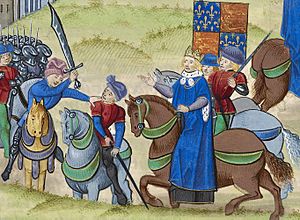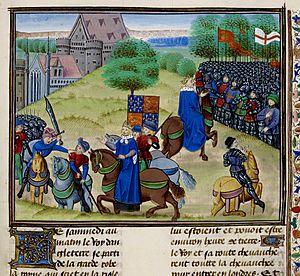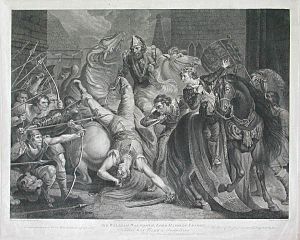Wat Tyler facts for kids
Quick facts for kids
Wat Tyler
|
|
|---|---|

Tyler's death (left to right: Sir William Walworth, Mayor of London (wielding sword); Wat Tyler; King Richard II; and Sir John Cavendish, esquire to the king (bearing decorated sword)
|
|
| Born | c.1320/4 January 1341 |
| Died | 15 June 1381 London, England
|
| Nationality | English |
| Known for | Peasants' Revolt |
Wat Tyler (born around 1341 – died 15 June 1381) was an important leader of the Peasants' Revolt in England. This big uprising happened in 1381. He led many rebels from Canterbury all the way to London. They wanted to stop a new tax called the poll tax. They also demanded better economic and social conditions for everyone. The rebellion started well, but it didn't last long. Wat Tyler was killed by officers loyal to King Richard II. This happened during talks in Smithfield, London.
Contents
Wat Tyler's Early Life
Not much is known about Wat Tyler's early years. Some historical records say he was born on January 4, 1341. Other sources suggest he was born around 1320. Most historians believe he was born closer to 1341. He was very interested in the ideas of John Ball. Ball was a radical priest who had been freed from jail by Tyler's group.
Tyler was likely born in Kent or Essex. His first name, "Wat," might have been his real name. It could also be a shorter version of "Walter." We don't know his original family name. People think "Tyler" came from his job as a roof tiler. But this is not fully confirmed. Before the Peasants' Revolt, he probably lived in Kent or Essex. Some stories say he was from Dartford or Maidstone in Kent. Others say he was from Deptford (which was in Kent then) or Colchester in Essex.
The Peasants' Revolt of 1381
The Peasants' Revolt started in May 1381. It was sparked by a new poll tax. This tax made every adult, rich or poor, pay 4 pence. But the revolt was about more than just money. Peasants also wanted more freedom and social changes. They demanded the right to work for any employer they chose. They also wanted to end serfdom. Serfdom meant they were tied to the land and had very few rights.
Uprisings happened all over England. Much of the trouble was in Essex and Kent. Many peasants were inspired by John Ball. He was a priest who taught that all people should be treated equally. He famously asked, "When Adam delved and Eve span/Who was then the gentleman?" This meant that everyone came from the same beginnings.
It's not clear how Wat Tyler joined the revolt. One story from the 1500s says a man named John Tyler started it. This story claims a tax collector had insulted John Tyler's daughter. In revenge, he killed the tax collector. This act supposedly started the uprising. By June 1381, Wat Tyler had become a main leader. He led the forces from Kent as they marched on London.
On June 13, the rebels reached London. They crossed London Bridge. Once inside the city, they attacked government buildings. They destroyed legal records and opened prisons. They also looted homes and killed people linked to the king's government.
King Richard II was only 14 years old at the time. He met with the rebels on June 14, 1381. He agreed to many of their demands. He also promised to pardon everyone involved in the rebellion. Some rebels were happy with the king's promises and went home. But Wat Tyler and his followers were not satisfied.
Wat Tyler's Death

On June 15, 1381, Tyler and his Kentish rebels met King Richard again. This meeting was at Smithfield, just outside London. Tyler spoke directly with the young king. He presented his demands. At first, the meeting seemed to go well. Tyler spoke to the king in a friendly, though perhaps too casual, way. King Richard agreed to grant the rebels "all that he could fairly grant."
However, the mood quickly changed. One writer from that time said Tyler acted disrespectfully. He asked for water to rinse his mouth. He then rinsed his mouth rudely in front of the king. Sir John Newton, a servant of the king, insulted Tyler. He called him "the greatest thief and robber in all Kent." Tyler then attacked Newton. But he was stopped and arrested by the Lord Mayor of London, William Walworth. Tyler tried to stab the mayor, but the mayor's armor protected him. Tyler was badly wounded by the king's servants. He managed to ride a short distance before falling from his horse.
After this chaos, Tyler was taken to a hospital for the poor. But the mayor found him. Tyler was brought back to Smithfield and publicly beheaded. With their leader dead, Tyler's followers were forced out of London. The rebellion quickly fell apart. King Richard II then took back all the promises he had made to the rebels. Many rebels were hunted down and executed. This brought the revolt to an end.
Tributes to Wat Tyler
Several places are named after Wat Tyler.
- A part of the A249 road in Maidstone is called "Wat Tyler Way."
- "Tyler's Causeway" in Hertfordshire is named for the path some of his followers took. They were fleeing London after his death.
- A road on the west side of Blackheath is named Wat Tyler Road.
- Wat Tyler Country Park in Essex is named after him.
- The offices of Swindon Borough Council are in Wat Tyler House.
- A memorial for Wat Tyler and the Great Rising of 1381 was put up on July 15, 2015. It is in Smithfield, London.
See also
 In Spanish: Wat Tyler para niños
In Spanish: Wat Tyler para niños
- John Ball and Jack Straw, other leaders of the 1381 Peasants' Revolt
- King Richard II
 | Roy Wilkins |
 | John Lewis |
 | Linda Carol Brown |


